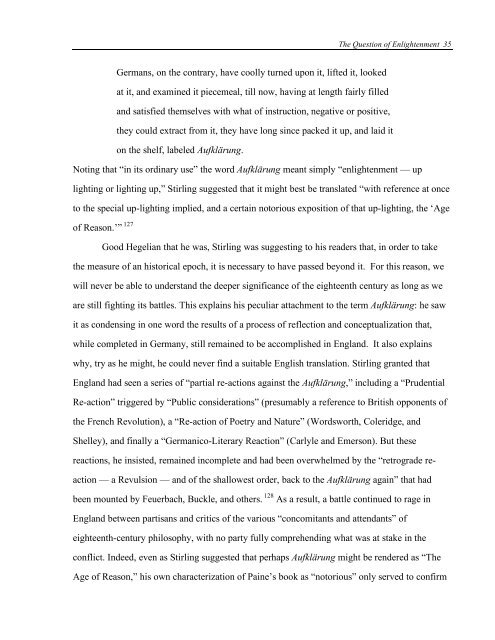The Question of Enlightenment - Theory and Practice in Eighteenth ...
The Question of Enlightenment - Theory and Practice in Eighteenth ...
The Question of Enlightenment - Theory and Practice in Eighteenth ...
You also want an ePaper? Increase the reach of your titles
YUMPU automatically turns print PDFs into web optimized ePapers that Google loves.
<strong>The</strong> <strong>Question</strong> <strong>of</strong> <strong>Enlightenment</strong> 35<br />
Germans, on the contrary, have coolly turned upon it, lifted it, looked<br />
at it, <strong>and</strong> exam<strong>in</strong>ed it piecemeal, till now, hav<strong>in</strong>g at length fairly filled<br />
<strong>and</strong> satisfied themselves with what <strong>of</strong> <strong>in</strong>struction, negative or positive,<br />
they could extract from it, they have long s<strong>in</strong>ce packed it up, <strong>and</strong> laid it<br />
on the shelf, labeled Aufklärung.<br />
Not<strong>in</strong>g that “<strong>in</strong> its ord<strong>in</strong>ary use” the word Aufklärung meant simply “enlightenment — up<br />
light<strong>in</strong>g or light<strong>in</strong>g up,” Stirl<strong>in</strong>g suggested that it might best be translated “with reference at once<br />
to the special up-light<strong>in</strong>g implied, <strong>and</strong> a certa<strong>in</strong> notorious exposition <strong>of</strong> that up-light<strong>in</strong>g, the ‘Age<br />
<strong>of</strong> Reason.’” 127<br />
Good Hegelian that he was, Stirl<strong>in</strong>g was suggest<strong>in</strong>g to his readers that, <strong>in</strong> order to take<br />
the measure <strong>of</strong> an historical epoch, it is necessary to have passed beyond it. For this reason, we<br />
will never be able to underst<strong>and</strong> the deeper significance <strong>of</strong> the eighteenth century as long as we<br />
are still fight<strong>in</strong>g its battles. This expla<strong>in</strong>s his peculiar attachment to the term Aufklärung: he saw<br />
it as condens<strong>in</strong>g <strong>in</strong> one word the results <strong>of</strong> a process <strong>of</strong> reflection <strong>and</strong> conceptualization that,<br />
while completed <strong>in</strong> Germany, still rema<strong>in</strong>ed to be accomplished <strong>in</strong> Engl<strong>and</strong>. It also expla<strong>in</strong>s<br />
why, try as he might, he could never f<strong>in</strong>d a suitable English translation. Stirl<strong>in</strong>g granted that<br />
Engl<strong>and</strong> had seen a series <strong>of</strong> “partial re-actions aga<strong>in</strong>st the Aufklärung,” <strong>in</strong>clud<strong>in</strong>g a “Prudential<br />
Re-action” triggered by “Public considerations” (presumably a reference to British opponents <strong>of</strong><br />
the French Revolution), a “Re-action <strong>of</strong> Poetry <strong>and</strong> Nature” (Wordsworth, Coleridge, <strong>and</strong><br />
Shelley), <strong>and</strong> f<strong>in</strong>ally a “Germanico-Literary Reaction” (Carlyle <strong>and</strong> Emerson). But these<br />
reactions, he <strong>in</strong>sisted, rema<strong>in</strong>ed <strong>in</strong>complete <strong>and</strong> had been overwhelmed by the “retrograde reaction<br />
— a Revulsion — <strong>and</strong> <strong>of</strong> the shallowest order, back to the Aufklärung aga<strong>in</strong>” that had<br />
been mounted by Feuerbach, Buckle, <strong>and</strong> others. 128 As a result, a battle cont<strong>in</strong>ued to rage <strong>in</strong><br />
Engl<strong>and</strong> between partisans <strong>and</strong> critics <strong>of</strong> the various “concomitants <strong>and</strong> attendants” <strong>of</strong><br />
eighteenth-century philosophy, with no party fully comprehend<strong>in</strong>g what was at stake <strong>in</strong> the<br />
conflict. Indeed, even as Stirl<strong>in</strong>g suggested that perhaps Aufklärung might be rendered as “<strong>The</strong><br />
Age <strong>of</strong> Reason,” his own characterization <strong>of</strong> Pa<strong>in</strong>e’s book as “notorious” only served to confirm


